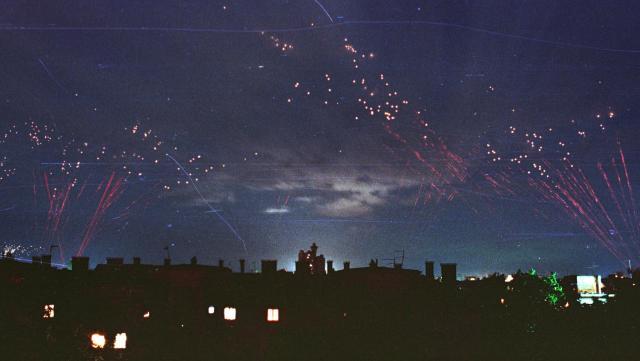NATO general compares 1999 attack on Serbia to Nagasaki
The bombing of the Federal Republic of Yugoslavia (Serbia and Montenegro) was "NATO's experimental war."
Monday, 19.06.2017.
11:40

NATO general compares 1999 attack on Serbia to Nagasaki
In addition, Di Grazia says he saw parallels between the 1999 bombing, and the atomic bomb the US used against the Japanese town of Nagasaki."It was an experimental war that NATO used to, among other things, train its air force, during an attack where there was an incomparable disproportion between those attacking, and those defending themselves," Di Grazia told Belgrade-based daily Politika, speaking about the 1999 war.
He gave the interview last week when he visited Serbia to promote his book, "Why NATO bombed Serbia" - where he speaks about his experiences in service.
Commenting on the parallel that he draws between the 1999 bombing, and the atomic bomb used against Nagasaki, Di Grazia said that "if the atomic bomb dropped on Hiroshima is in part to be seen as military action, the next, the one dropped on Nagasaki - at a time when Japan had already accepted capitulation - marked the beginning the Cold War and was a message of sorts that the US sent to the Soviet Union."
"Whereas by bombing Serbia," the retired Italian general continued, "a message was sent to Russia about who the winner in the Cold War was."
"And none of it was the fault of Serbia, which did everything it could, because international circumstances were such that Russia was weak," he stressed.
When the interviewer remarked that NATO's bombing of the Chinese embassy in Belgrade could, in that case, be interpreted as a warning of the West to China, Di Grazia emphasized that this was his personal conclusion, just as he thought that the NATO bombing of Serbia overall was a warning to a weakened Russia.
Now, he says, the situation is significantly different.
"Why is nobody considering bombing North Korea at this moment? Because of nuclear weapons, but also because of the fact that China is behind it, who has since been strengthened. Also, Russia has regained the title of superpower, and what it did with Georgia, Moldova and especially Crimea, is similar to what NATO has done with Kosovo. That is why Kosovo in 1999 was a unique case that will not happen again," says Di Grazia.
He also spoke about his doubts regarding the official interpretation of Racak (in Kosovo) and Markale (in Bosnia) cases, stating he did not believe "the Serb explanation" of the events in the village of Racak.
"Only when, a few days later, I met a colleague, an Italian officer serving as an OSCE observer, he said to me: 'Biaggio, it's not like they show it on TV. I informed the head of mission (William Walker) about it.' He was the first to arrive at the location and he did not find the scenes that were later reported by the media. However, after he sent his report to the head of mission, nothing happened," said Di Grazia.
He is convinced that Kosovo Albanians were happy when Racak happened - "and if it had not, they would certainly have fabricated one at a convenient time."
Di Grazia expressed similar doubts about the Markale market bombing in Sarajevo in the first half of the 1990s, stating that his report to the ECMM (European Community Monitoring Mission) command had met a similar fate as the Racak report filed by his Italian colleague.
"I sent it after the investigation that I conducted in the wake of the bombing of Markale, doubting that the Serbs would target a market located a few steps away from an Orthodox church. They were not interested, and again nothing happened," said Di Grazia.









































Komentari 31
Pogledaj komentare